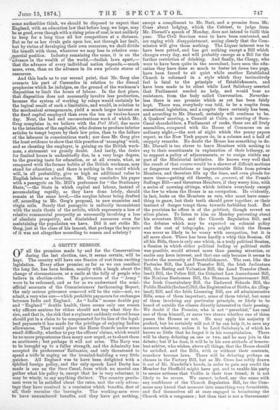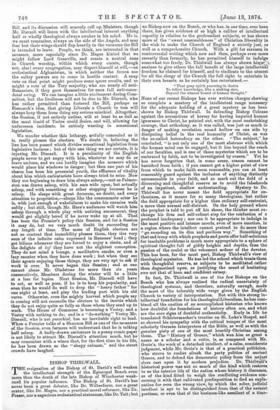A GRITTY SESSION.
OF all the promises made by and for the Conservatives during the last election, one, it seems certain, will be kept. The country will have one Session of rest from exciting legislation. Every other promise; so far as we can recollect the long list, has been broken, usually with a laugh about the change of circumstances, or a smile at the folly of people who believe in election-cries. The grievances of the " Army " were to be redressed, and as far as we understand the semi- official accounts of the Commissioners' forthcoming Report, the only serious grievance removed will be the rule—not, we admit, a very wise one—which prohibits payments for exchanges between India and England. As " India " means double pay and "England" double health, there seems only one reason why officers anxious for either should not buy what they de- sire, and that is, the risk that a regiment suddenly ordered home should put in a claim to be compensated for its loss of the legal- ised payments it has made for the privilege of enjoying Indian allowances. That would place the Horse Guards under some small difficulty, whether to pay the officers' claims, which would be no more preposterous than many now urged, or to shoot them as mutineers ; but perhaps it will not arise. The Navy was to be brought up to a fuller strength, and the Admiralty has accepted its predecessors' Estimates, and only threatened to spend a trifle'in urging on the ironclad-building a very little _quicker. All England was to have been delighted with a tipirited foreign policy, and the only speech Lord Derby has made is one on the Suez Canal, from which no mortal can gather what his policy is, except that he is very reluctant, it may be wisely, to say anything distinct. The country gentle- men were to be satisfied about the rates, and the only advan- tage they have received is a remission which benefits, first of all, their enemies the boroughs. The working-men were to have unnumbered benefits, and they have got nothing, except a compliment to Mr. Burt, and a promise from Mr. Cross about lodging, which the Cabinet, to judge from Mr. Disraeli's speech of Monday, does not intend to fulfil this year. The Civil Services were to have been contented, and are raging with disappointment, seeing clearly that the Com- mission will give them nothing. The Liquor interest was to have been petted, and has got nothing except a Bill which changes every day, and will probably emerge as a Bill for the further restriction of drinking. And finally, the Clergy, who were to have been quite in the ascendant, have seen the edu- cation they have done so much to foster let down two pegs, have been forced to sit quiet while another Established Church is reformed in a style which they instinctively feel is fatal to the principle of Establishments, and have been made to be silent while Lord Salisbury asserted that Parliament needed no help, and would bear no resistance, from the body called Convocation. Neverthe- less there is one promise which as yet has been fairly kept. There was, everybody was told, to be a respite from sensational legislation, and a respite there certainly has been, and according to Mr. Disraeli, certainly will continue to be. A Quakers' meeting, a Council at Cairo, a meeting of Suez- Canal shareholders, a Parliament of rooks, these are all lively assemblies, compared with the House of Commons on an ordinary night,—the sort of night which the penny papers report, as the New York papers do, in a column and a half of snippety remarks. No doubt the House has something to do. Mr. Disraeli is too clever to leave Members with nothing to say to their constituents in explanation of their lethargy, or to support a policy of adjournments, or to resign visibly any part of the Ministerial initiative. He knows very well that the result of that course would be a shower of difficult motions or dangerous resolutions or impracticable Bills from private Members, and therefore fills up the time, and even pleads for more time—getting rid thereby, en passant, of the Female Suffrage Bill—and threatens Members, if they worry him, with a series of morning sittings, which irritate everybody except the few to whom the House is an occupation. He evidently, in fact, looks on the Members as rats, who must have some- thing to gnaw, lest their teeth should grow together, or their instinct of danger tempt them towards forbidden food. But the provision he offers is of the grittiest, though served on silver plates. To listen to him on Monday perorating about his seventeen Bills, and the Church Regulation Bill, and the debates which may be expected on colonial policy and the cost of telegraphs, you might think the House was never so likely to be weary with occupation, but it is all mere show. There has been hardly a whip this Session. Of all his Bills, there is only one which, in a truly political Session, a Session in which either political feeling or political strife was possible, would attract more than passing attention, or excite any keen interest, and that one only because it seems to involve the necessity of Disestablishment. The rest, like the Factories Bill, the Land Transfer Bill, the Irish Judicature Bill, the Rating and Valuation Bill, the Land Transfer (Scot- land) Bill, the Police Bill, the Criminal Law Amendment Bill, the Noxious Businesses Bill, the Shannon Improvement Bill, the Irish Constabulary Bill, the Endowed Schools Bill, the Public Health (Ireland) Bill, the Registration of Births, &c. (Eng- land) Bill, and the Irish Licensing Bill, are all administrative Bills, some of them important, some of them trivial, but none of them involving any particular principle, or likely to be heard of outside the classes directly interested in their passing. We doubt if the Premier, who is not "parochial," has read one of them himself, or cares two straws whether one of them passes the Houses or not. He may apply his majority if pushed, but he certainly will not if he can help it, to save any measure whatever, unless it be Lord Salisbury's, of which he knows so little that he forgot it in his recapitulation. There will be sharp debating on one or two, and he may join in the debate; but if he does, it will be in his new attitude of benevo- lent arbiter, who wishes, above all things, that the House should be satisfied, and the Bills, with or without their contents, somehow become laws. There will be debating perhaps on clauses in the Factory Bill, but as Mr. Cross has softly drawn it out of Mr. Mundella's hands, in order to gain any credit the Member for Sheffield might have got, and to enable his party to assure artisans that Codlin is their true friend, it is not likely to be severe. We cannot, indeed, say the same with any confidence of the Church Regulation Bill, for the Com- mons may knead that measure into something very formidable, and find themselves all at once engaged in broadening the Church with a 'vengeance; but then that is not a Government Bill, and its discussion will scarcely call up Ministers, though Mr. Disraeli will listen with the intellectual interest anything half or wholly theological always awakes in his mind. He is, we must remember, always on the side of the Angels, and may fear lest their wings should flap heavily in the vacuums the Bill is intended to leave. People, we think, are interested in that measure, more especially since Dr. Magee hinted that we might follow Lord Granville, and create a neutral zone in Church worship, within which every curate, though not, alas ! every congregation, may disport himself at will,—an ecclesiastical Afghanistan, in which neither the frozen nor the sultry powers are to come in hostile contact. A snap vote on that point might produce some queer results, and so might a vote of the Tory majority, who are nearly all anti- Bomanists, if they gave themselves for once full anti-sacer- dotal swing. We can imagine a little excitement during Com- mittee, but the liveliness will not be due to Mr. Disraeli, who has rather permitted than fostered the Bill, perhaps on Bismarck's idea, that giving Liberals a Church to toss will always keep them from doing any serious mischief. Altogether, the Session, if not entirely useless, will at least be as dull as the most timid of Tories could desire, and will, allowing for unforeseen incidents, be entirely wanting in sensational legislation.
We wonder whether this lethargy, artfully concealed as it is, really pleases the electors. We doubt it, believing the line has been passed which divides sensational legislation from legislative laziness ; but of this one thing we are certain, it is injuring Mr. Disraeli. It is a peculiarity of the English people never to get angry with him, whatever he may do or leave undone, and we can hardly imagine the measure which would place his' windows in danger ; but then one part of his charm has been his perennial youth, the effluence of vitality about him which caricaturists have always tried to seize. Now they are beginning to draw him always asleep,—not as Palmer- ston was drawn asleep, with his ears wide open, but actually asleep, and with something or other stopping because he is asleep. He sleeps with great decorum, no doubt, and every attention to proprieties,—sleeps like the consummate actor he is, with just enough of wakefulness to make his enemies walk softly ; but still, though Mr. Hare's audiences will watch him asleep through a whole play with untiring amusement, they would get slightly bored if he never woke up at all. That has been the Premier's policy this Session, and for a Session it may do, but we very much doubt its succeeding for any length of time. The mass of English electors are not so content that immobility pleases them, they tire very soon of the infinite calm expressed in Rameses' head ; they
get bilious whenever they are forced to enjoy a siesta, and of
the delights of kef they have not the slightest conception. They do not mind a lounge, a meditative smoke, or even a
lazy saunter when they have done work ; but when they see their agents enjoying those things, they are very apt to ask if work is over. It never began this Session ; and as one cannot abuse Mr. Gladstone for more than six years consecutively, Members during the winter will be a little at a loss for topics. Next Session, Mr. Disraeli will have to act, as well as pose, if he is to keep his popularity, and even then he would do well to drop the "heavy father" for one night at least, and play the leading part with his old verve. Otherwise, even the mighty harvest which people say is coming will not reconcile the electors to the inertia which they do not enjoy quite so fully as those whom they send up to work. The House of Commons is becoming a Vestry, and a Vestry with nothing to do; and in a "do-nothing" Vestry Mr. Disraeli, who is not parochial, has no inevitable right to lead.
When a Premier talks of a Shannon Bill as one of the measures of the Session, even farmers will understand that he is talking half asleep. A badly-drawn caricature in a penny comic paper is not likely to attract Mr. Disraeli's attention much, but he may remember with a wince that, for the first time in his life, he has been drawn as the "sleepy cabman," and the street crowds have laughed.



































 Previous page
Previous page